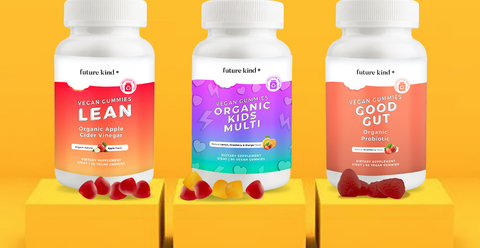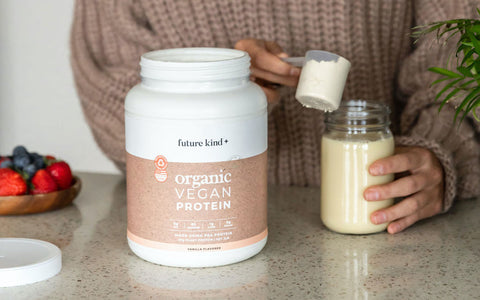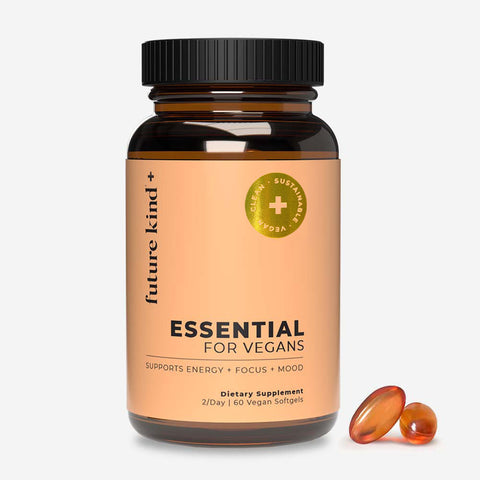Taking your daily dose of health-promoting vitamins, especially vitamin C and B vitamins like fitness enthusiasts' beloved vitamin B12, is becoming an integral part of many people's day-to-day routine.
Some love taking their vitamin supplements in the morning, going for a big gulp of water right after their breakfast protein powder, while others prefer taking them (along with a melatonin gummie or sleep supplement) in the evening with their stomachs full before going to sleep. Maybe you're one of those incredibly diligent people who always make sure to get their handful of vitamin supplements right after a big workout, along with their trusted green, protein-packed smoothie.
The large majority of us, however, take our vitamins at different times every day - following the much less diligent "whenever I remember to take them" schedule.
These varying vitamin routines beg the question: can the time you take your supplements ever impact how your body absorbs them or how they are used in your system? Is timing even important at all when it comes to vitamins?
When To Take Vitamin B12 (The Best Time of Day)?

Here's the TL;DR on vitamin timing: while there is no official medical advice dictating that you should take vitamin supplements at a specific time of day to improve their efficiency, there is quite a lot of research showing that avoiding some vitamin supplements at particular times (or more accurately, with particular meals) can improve absorption, or that taking some vitamins alongside food can reduce the risk of adverse side effects.
The specific advice on the best time to take your chosen supplements will depend on the type of vitamin you're dealing with: fat-soluble or water-soluble.
In the case of water-soluble vitamins like B12, vitamin C, folic acid, and other B vitamins, some medically reviewed literature points to early morning as the optimal time to take them as they can be taken on an empty stomach, but more peer-reviewed research is needed to confirm this claim. What has been proven, however, is that the vitamin B complex can help reduce stress, so if you're looking to start the day in the best mood, taking these supplements early in the morning before any meal is the way to go!
On top of that, it's important to know that the majority of water-soluble nutrients cannot be stored by our body for later use, meaning that our system will only be able to absorb so much in a given period. The optimal course of action is to consume exactly what you need upon waking up, forget about it, and go on with your day knowing your nutrient requirements are all taken care of.
The fat-soluble vitamin type, on the other hand, dissolves in oil (hence the name!) and can be stored by our body to use later, so fat-soluble vitamin supplements should always be taken alongside a satisfying meal incorporating some fat to enhance absorption.
Can you take vitamin b12 at night?
You can definitely opt for taking vitamin B12 supplements at night if that's what works best for you, although the natural energy-boosting abilities of vitamin B12 might be put to better use as you're starting the day.
As vitamin B12 seems to be better absorbed on an empty stomach (or better yet, acidic environment), you should try to wait for a few hours after having your evening meal before taking them.
How Much Vitamin B12 Should You Take Daily?
The recommended daily intake for vitamin B12 is approximately 2.4mg for adults, peaking at 2.6mg and 2.8mg for pregnant and lactating women respectively, and 1.8mcg maximum for children under 13 years old.
However, it's crucial to keep in mind that the RDI for this nutrient does not equal the right dosage.
B12 is very poorly absorbed by our bodies, so much so that taking a 240mcg supplement might have you absorbing only 2.4mcg. So, going well over what the RDI dictates is non-negotiable, especially when it comes to seniors over 65 who will experience a decline in absorption rates as they age. To ensure you are actually absorbing enough, opt for taking supplements containing 500mcg of vitamin B12 or more, up to 1000mcg for seniors over 65.
Supplementation aside, you should always aim to get the majority of your nutrients from food sources, but when it comes to vitamin B12, that's definitely easier said than done, especially for those following plant-based diets free of all animal products.
Although dairy and meat products are usually considered good food sources of vitamin B12, the actual B12 levels contained in these products tend to vary greatly, as livestock is regularly supplemented with B12 injections to avoid deficiencies, making for a less than reliable (and natural!) source. The B12-producing bacteria that used to populate our soils have been depleted through modern agricultural techniques, meaning that even grazing livestock is unlikely to get enough B12 for us to absorb efficiently by consuming animal-derived food.
The solution to this problem is to get our B12 directly from the most accessible source: B12 supplements.
How Much Vitamin B12 Is Safe To Take?
Note that our body is not very efficient at absorbing vitamin B12 from supplements, so it's better to stay on the safe side by aiming to consume well over the minimum recommended amount, rather than taking a little less or sticking to the RDI.
As we previously mentioned, it's estimated that your body can only absorb approximately 10mcg of B12 out of a 500mcg supplement, so it's always in your best interest to plan accordingly by choosing a vitamin B12 supplement that will contain much more than you what you theoretically need to meet your daily requirements! Note that unlike other water-soluble vitamins, B12 can be stored in the liver for a long time, so it might be years before B12 deficiency symptoms start appearing.
There is no research showing that taking well over the recommended daily or weekly amount of B12 can be unsafe or detrimental to your health, and an official upper tolerable intake level has yet to be established. If you fish around the internet enough, you will find some anecdotal claims of insomnia and restlessness linked to excessive B12 intake, but direct causality has yet to be analyzed by experts.
Can vitamin b12 be taken on an empty stomach?

Vitamin B12 supplements can be taken on an empty stomach, as long as you make sure you can handle it!
On top of the already discussed benefits for energy levels and combating stress, taking vitamin B12 on an empty stomach will aid absorption by creating an acidic environment — the same goes for all nutrients that are not fat-soluble.
You should also make sure to stay clear of caffeine for at least an hour after taking your vitamin B12 supplement, as consuming coffee, tea, or even chocolate soon after taking your supplement may inhibit efficient absorption and promote early excretion.
Instead of reaching for your morning cup of Joe as soon as you wake up, try doing some light exercise to experience the same quick boost of energy, free of any side effects!
Best vitamin B12 to take?
Not all vitamin supplements are created equal, and when it comes to vitamin B12, the question of what form of B12 is the safest and most efficient is still a hot-button topic among experts and health enthusiasts.
The three forms of vitamin B12, cyanocobalamin, methylcobalamin, and adenosylcobalamin have been shown to have different conversion and absorption rates, with methylcobalamin (the naturally occurring form of B12) regarded as the most optimal for assisting in the methylation cycle. This is a crucial metabolic process that regulates hormone and DNA synthesis, second to none in the importance that B12 plays in our system's metabolism and immunity functions.
Cyanocobalamin, on the other hand, has been shown to not be converted into active B12 as efficiently, even though it remains to this day the most popular form of B12 available on the market.
We recommend opting for methylcobalamin-based supplements like our B12 Spray (featuring 500mcg) or methylcobalamin+adenosylcobalamin options like our Essential Multivitamin For Vegans (400 mcg) which with the combined vitamins boosts bioavailability and makes the most out of B12's incredibly energizing properties!
How To Take Vitamin B12 (The Best Way)
So, how can you make sure you are maximizing absorption and reaping the benefits of the incredible energy-boosting properties of vitamin B12 every time you get your daily dose?
The best time to take your vitamin B12 supplement is whenever it works best for your routine.
Early in the morning, before you have any food and before you reach for your early bird pick-me-up cup of coffee seems to work for many people, but any time in the day (as long as you stay consistent!) should get the job done.
If you're leaning towards mornings, you might find useful keeping your vitamin B12 supplements right next to your bed or in your bathroom's medicine cabinet, so that you can get a daily visual cue that will make taking vitamin supplements in the morning as easy as remembering to brush your teeth!
You should always opt for stocking up on pure and efficient methylcobalamin-based B12, making sure to read the ingredients label carefully for any hidden nasties, and reach for a daily dose that will meet your requirements, plus some to ensure absorption (2000mcg weeky for adults under 65 should do the job just fine!).
If improved health and vitality is what you're after, you should also aim to get plenty of B12 through your food, incorporating health-promoting fortified foods like nutritional yeast, natural fortified cereal, and fortified plant milks into your diet (and maybe a few vegan gummy vitamins on top to help with specific issues).
Try keeping track of exactly how much vitamin B12 you are consuming on a weekly basis and promptly consult your primary care physician if you start experiencing any adverse symptoms, like trouble sleeping at night or gastrointestinal discomfort — you might want to lower your dosage if nothing else but your weekly vitamin B12 consumption has changed!
Frequently Asked Questions
Can I take B12 with other vitamins? Yes, B12 can be taken alongside other water-soluble vitamins (like vitamin C and other B vitamins). Avoid taking it with caffeine, which may reduce absorption.
Will B12 keep me awake at night? Some people report increased alertness from B12, while others notice no effect. If you're sensitive to its energizing properties, stick to morning dosing.
How long does it take for B12 supplements to work? Most people notice energy improvements within 1-2 weeks, but it can take 2-3 months to fully replenish depleted stores.
Can you overdose on B12? No established upper limit exists. Excess B12 is excreted through urine. High doses are generally considered safe, though some people may experience minor side effects.
Should I get my B12 levels tested? If you're experiencing symptoms of deficiency, follow a plant-based diet, are over 50, or take medications that interfere with B12, annual testing is a good idea.
These statements have not been evaluated by the Food and Drug Administration. This information is for educational purposes and is not intended to diagnose, prevent, treat, or cure any disease. Always consult your healthcare provider before starting any new supplement regimen.









Comments (0)
There are no comments for this article. Be the first one to leave a message!